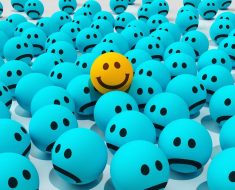I was a highly sensitive child. I cried if I had to talk to adults. I cried when I was embarrassed, when my feelings were hurt or when my siblings teased me. I come from an Anglo-Celtic background in which crying was often, I found, not understood or easily tolerated. Comfort wasn't automatically extended.
“If you bawl your eyes out … people say, ‘I’m sorry’, as if crying is bad manners. But, of
course, it’s not.”
Emotional tears are exclusive to humans and we begin to cry when we are babies as a way to communicate. When we are older and learn how to speak, we're often told to stop crying. We're taught that crying is shameful, something only babies do.
"From the time we were little we've heard, 'Don't be such a sook' or 'It's not that bad'; we praise people who are strong," says grief expert Doris Zagdanski of mygriefassist.com.au, a website that provides information about dealing with loss and sorrow.
"If we haven't had crying role-modelled to us in the family, it's really hard to [give yourself] permission to cry."
Zagdanski says people feel they should conform to social conventions. "If you bawl your eyes out, you don't say you're 'proud'. People often say, 'I'm sorry' when they burst into tears, as if crying is bad manners. But, of course, it's not."
In his book The Voice of the Body, the late American psychotherapist Alexander Lowen says, "It is a grave injustice to a child or adult to insist that they stop crying. One can comfort a person who is crying, which enables him to relax and makes further crying unnecessary, but to humiliate a crying child is to increase his pain."
Thankfully, that stiff upper lip attitude is waning. It's not uncommon to see people of all nationalities, status and gender crying with emotion in public. Nobody wants to be seen in an "ugly cry" but we're slowly beginning to accept that crying is an emotional release that may be good for us.
Crying can help release all kinds of stress, make us feel lighter and connect us to caring people, says Howard Todd-Collins, psychotherapist and director at Men and Relationships Counselling in Melbourne.
"People feel more accepted and recognised as being human when they show tears," he explains.
A 2014 study published in the journal Frontiers in Psychology found that people who cry were more likely to experience a positive change in their mood if they were comforted by others around them.
Although I used to be a crier, I'm now a suppressor and I believe that's due to living in a household with a "harden up" mentality.
I've bottled up my tears to avoid arguments or not to be a burden and now I find it difficult to cry at all. Instead of being sensitive, these days I swing between apathy and bitterness because I feel I don't have a safe place to express myself.
"Emotional suppression is a way of avoiding feelings – it's a coping strategy," explains Todd-Collins. "But sometimes when we push thoughts and feelings away, those things come back with more strength. When we try to avoid powerlessness, helplessness or sadness, we respond by being more frustrated and angry." A shift towards accepting tears has begun – but are we safe to cry at work, school or at the dinner table?
"I'm not sure there's enough of a narrative around the acceptance of feelings of helplessness, fear, loss and sadness," says Todd-Collins. "We're better, but still have a long way to go."
Source: Read Full Article





